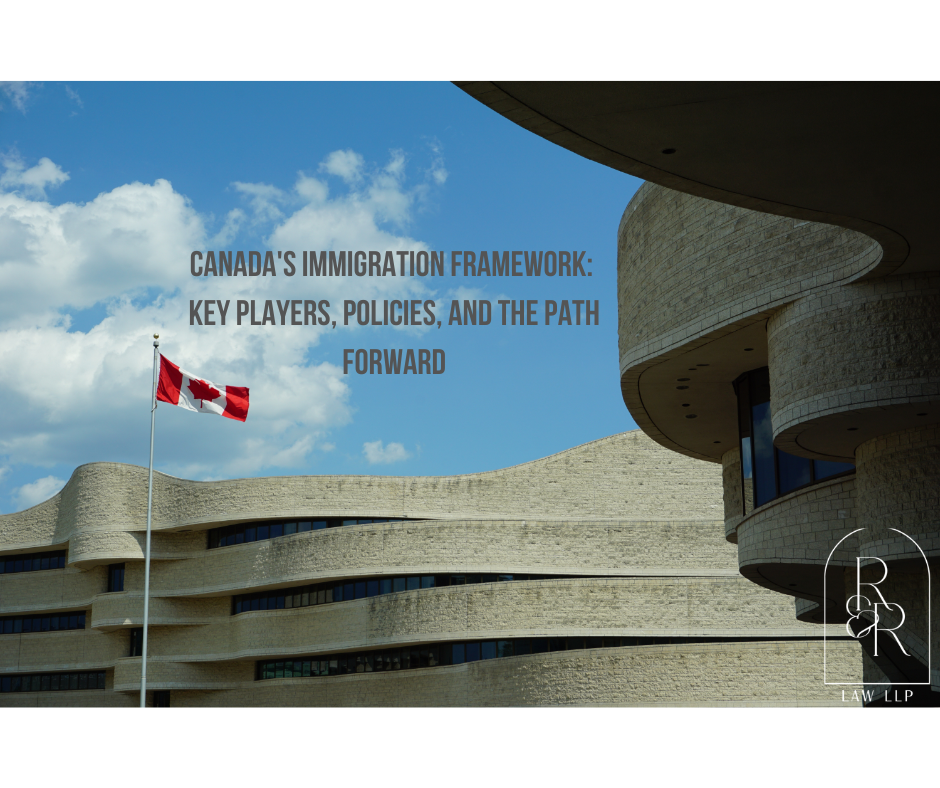Weekly Blogs-Canada's Immigration Framework: Key Players, Policies, and the Path Forward

Introduction
Canada's immigration policy is a complex and multifaceted system designed to address various national priorities. In 2021, Canada welcomed a historic 406,000 permanent residents, and the government aims to increase this number to 500,000 per year by 2025. This ambitious target supports national goals such as addressing labor shortages, fulfilling humanitarian commitments, and reuniting families. These priorities are encapsulated in the Immigration and Refugee Protection Act (IRPA), which outlines the fundamental objectives of Canada's immigration policy.
Federal and Provincial Roles in Immigration
Canada's immigration system is a shared responsibility between federal and provincial governments, with the IRPA serving as the primary legislative framework. The federal government sets admission requirements, national immigration levels, and eligibility criteria for various immigration categories. The provinces and territories, on the other hand, play a crucial role in selecting economic immigrants to meet their specific labor market needs.
The IRPA authorizes the creation of detailed regulations and ministerial instructions, which are critical for managing immigration processes efficiently. Ministerial instructions provide flexibility to address immediate needs, such as implementing pilot programs or adjusting processing priorities.
Key Legislative Instruments
The IRPA establishes three main categories of permanent residents: family class, economic class, and humanitarian cases. It also sets out the requirements for temporary visitors, including work and study permits. The regulations derived from the IRPA provide detailed guidelines for these categories, including selection criteria for economic immigrants and procedures for biometric information collection.
Significant amendments to the IRPA, such as those introduced in Bill C-19, have refined programs like Express Entry to better align with economic priorities, such as specific work experience or French language proficiency.
Operational Guidelines and Judicial Oversight
Canada's immigration policy is executed by various bodies, including Immigration, Refugees and Citizenship Canada (IRCC), the Canada Border Services Agency (CBSA), and the Immigration and Refugee Board of Canada (IRB). Operational guidelines, distributed as instructions, bulletins, and manuals, ensure consistent application of the IRPA. Although these guidelines are not legally binding, courts often refer to them to interpret the IRPA.
The IRB, an administrative tribunal with four divisions, plays a vital role in processing refugee claims, detention reviews, and immigration appeals. The judiciary also influences immigration policy by reviewing decisions made under the IRPA, ensuring that immigration practices adhere to legal standards.
Provincial Immigration Programs
Provinces and territories have increasingly taken on more responsibility for economic immigration through Provincial Nominee Programs (PNPs). These programs allow provinces to tailor immigration to their specific labor market needs while the federal government assesses the admissibility of nominated individuals.
Quebec has a unique position under the 1991 Canada–Québec Accord, allowing it to select all economic immigrants and manage its own settlement programs. Other provinces, while not having the same breadth of responsibility as Quebec, actively participate in selecting economic immigrants through bilateral agreements with the federal government.
Conclusion
Canada's immigration policy, guided by the IRPA and shaped by federal-provincial collaboration, aims to maximize the social, cultural, and economic benefits of immigration. This collaborative approach ensures the immigration system is responsive to national and local priorities, fostering a prosperous and inclusive society. As policies continue to evolve, balancing economic needs, humanitarian commitments, and integration of new residents remains a core focus.
Navigating Canada's complex immigration system requires a deep understanding of the legislative framework and government roles. Whether you are an individual or a business, staying informed and prepared is essential. Our firm specializes in providing comprehensive immigration services tailored to your unique needs. From assessing eligibility and preparing applications to navigating federal and provincial regulations, we are here to help every step of the way.
Contact us today to discuss how we can assist you in achieving your immigration goals and ensuring a smooth transition. Let our expertise work for you in making Canada your new home or fulfilling your business requirements.
Contact R&R Law LLP for Assistance
Please contact us or schedule a consultation call with our team. Also, to stay updated on the latest Canadian immigration news, we recommend following our LinkedIn page.
Regards,
Rema and Rebecca
